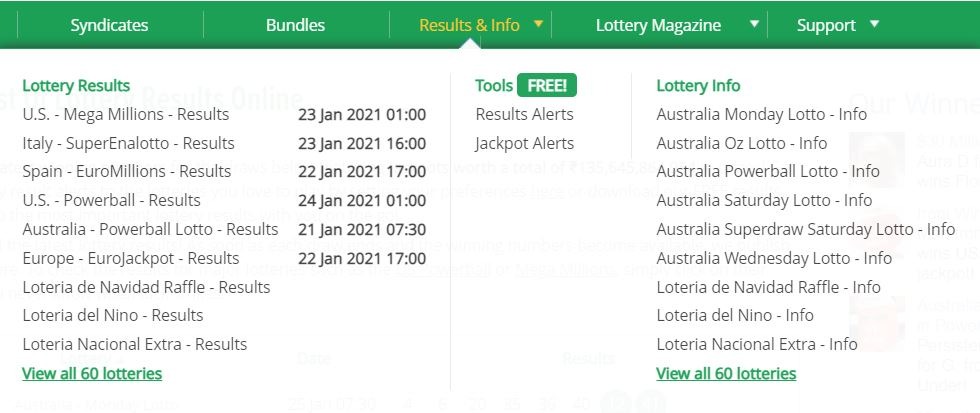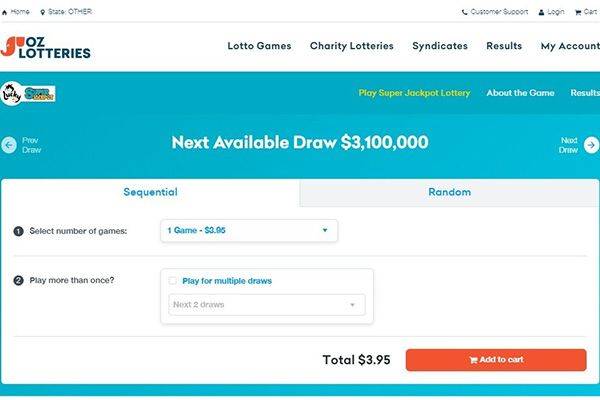Is Oz Lotteries App Legit
Without getting into the pros and cons of gambling I want to know what people think of Ozlotteries.
Last Tuesday I received an email from PinchMe advertising the Oz Lotto draw that night. The email had a link to Ozlotteries and there you can open an account and buy tickets. On their website you can buy tickets for all of the lotteries available in NSW. Somehow I thought that the price for a game was the same everywhere. And I thought that Ozlotteries was an official site for buying tickets. But now that I’ve gone back and had a look it appears that are just a middleman scalping fees.
Take for example a ticket in the super jackpot. The normal ticket price is $2.00 and as I understand it the extra $0.20 is the commission for the newsagent or seller. For that same ticket Ozlotteries charges $2.65. So $2.00 goes to the group that runs the lottery and $0.65 goes to Ozlotteries. And it’s the same for all the other products on Ozlotteries.
Using the Lott App. Find out about how to download the Lott App, key functions and technical troubleshooting. Our Player Programs. Everything you need to know about our Winners Circle, Players Club, Tatts Card and Easiplay Club membership programs. Can’t find what you’re looking for? Call our Customer Contact Centre on 131 868.
From what I can see you’re getting the exact same product and service on both sites except on one site you pay extra for everything. Is there some good reason to use Ozlotteries over the other site?
- Download this app from Microsoft Store for Windows 10, Windows 8.1. See screenshots, read the latest customer reviews, and compare ratings for OZ Lotto Quick Picks.
- Oz Lotteries is a separate entity to The Lott (Tatts Group) and act as an accredited re-seller on behalf of Tabcorp. Due to our licensing agreement with Tabcorp, for our Queensland residents we are not able to sell Commercial lotteries online, only Charitable Lotteries.
Am I missing something here or is Ozlotteries a scam?
- Lottery Scams
A lottery scam is an attempt to fraudulently extract money from someone by pretending to be a legitimate lottery company or winning player. It has sadly become a too common method of deception as such scams prey on people’s desire to win money and the popularity of big lottery games. Find out how to identify the most common types of scam and how to avoid them.
How to Spot a Lottery Scam
If you have received any suspicious correspondence, work through this checklist to see if you are getting scammed.
1. Did you enter that lottery on that date?
The golden rule for spotting a scam. If you did not play, either by buying a ticket or playing online, you cannot win.
2. Are you being asked for payment?
You will never be asked to pay a handling fee or any sort of charge by a legitimate company in order for your winnings to be released. An official company would pay your winnings in full and the only cost to you may be tax in the future.
3. Is the prize referenced realistic?
Look carefully at the prize, currency and lottery name to see if it makes sense and is consistent. For example, if you live in Canada and receive an email from a UK lottery telling you that you have won 10 million Indian rupees - that is a sign that this isn’t real.
4. Are you pressured to respond?
Lottery prizes do have expiry dates, but in most cases players will usually have several months or sometimes even a year or more from the day of the draw to come forward. A legitimate company would link to their terms and conditions if they made reference to any time constraints on claiming a prize.
Is Oz Lotteries App Safe
5. Are you being told to keep the news confidential?
This is a trick used to scare people. There is no reason why you can’t tell family or friends straight away about a genuine win. The scammers are just trying to limit the chances of their fraud being exposed so that they will not be reported to the police or to the genuine company they are pretending to be from.
6. Is the message professional?
Fraudsters are becoming increasingly sophisticated with the design and content of their scams, but you should still note how professional it looks. First, check to see if the lottery organisation actually exists. ‘Euro Mega Millions Corporation’ might sound plausible to both EuroMillions and Mega Millions players, but it’s actually completely fictitious. If the message is riddled with spelling mistakes and poor grammar, this is further warning it is probably a scam.
7. Do they know your name?
If you play online you could receive a genuine automated winner notification without your name, but look out for a message starting ‘Dear winner’ or ‘Dear account holder’, as it is a sign of a possible scam.
8. What does the email address look like?
Take a good look at the email address. Does it look like a genuine company’s email handle. A legitimate lottery will never send out a message from a personal Gmail or Hotmail account.
Is Oz Lotteries App Legit Reviews
Types of Scam

The most common type of scam informs you that you have won a lottery. You may then be told that you have to pay a handling fee of some kind before receiving your money, or that there has been a mistake and you have been overpaid and must return some of your winnings. Even if the scammer does not ask you for money straight away, they may just try to open the lines of communication so they can gain access to personal or financial information further down the line.
A variation on this theme is a scam where you are told that your email or phone number has been randomly selected as a winner, perhaps in a ‘second chance’ draw.
Another type of scam involves the fraudster pretending to be a lottery winner who wants to share their money with others. The name on the message may be the same as a real winner, claiming to have set up some sort of trust. While some winners are very charitable, they would not randomly contact strangers to give a part of their prize away.
Is Oz Lotteries App Legit Site
Scammers may also try to convince people that they have reduced lottery tickets for sale, declaring that it is a great opportunity to play for a fraction of the actual cost. This is usually done over the phone in an attempt to find out bank card details.
Communication Methods

- Email - Scam emails are becoming increasingly common, as they allow fraudsters to contact lots of people at the touch of a button for little or even no financial cost. The approach taken in an email scam closely mirrors that of a postal scam, with recipients directed how to respond.
- Letter – You may receive something through the post saying that you have won a prize and need to register your claim before you can receive the money. Postal scams target hundreds or even thousands of people simultaneously and are usually designed to look as authentic as possible, complete with various official-looking logos. You may be asked to call a telephone number to make your claim, or return a ‘claim form’ to a response address provided.
- Phone – If you receive a call saying you have won a prize, it is possible that the scammer will be very good at sounding professional and knowledgeable enough to make you feel confident that the news is genuine. You may be asked to provide personal information such as name, address, date of birth and so on, as well as financial information such as a credit/debit card or bank account number. The usual explanation is that you need to pay a handling charge, your card can be used as proof of identity so that the prize can be processed, or so that the prize can be deposited directly into your account. This is, of course, a lie.
- Text – You may receive a text message stating that you are the winner of a cash prize draw, mobile raffle, mobile lottery game or similar, and that your number has been chosen to win a cash prize. However, if you call the number provided you can expect hefty call fees, plus you may even get your phone hacked if you do respond. If you reply in any way, you are enabling the scammers to access the information on your phone, SIM card or even data from websites you have visited.
- Social Media – Scammers can now send messages through social media platforms, perhaps telling you that your profile has been chosen at random to win a ‘Facebook Raffle’ or ‘Facebook Lottery’. However, there is no such game organised by Facebook and never has been.
Golden Rules to Avoiding Lottery Scams
Follow these three key guidelines to help ensure you don’t get conned by a lottery scammer.
1 – Participation
First, remember that you cannot possibly win a lottery prize unless you have bought yourself a ticket for that game. Scammers will try and tell you that some lottery or other has randomly picked you to win or entered a number on your behalf, but it is not true. If you haven’t bought a ticket, you won’t win a lottery prize. Bearing this rule in mind will go a long way to making you immune to the scammers.
2 – Never send payment

A legitimate lottery will never ask for you to make a payment before your winnings can be processed. Do not give a scammer any personal or financial information, and do not respond to any suspicious correspondence or open any link in a suspicious email. If you have already responded, then break off contact straight away. If you have provided personal details, alert your bank immediately. You should also report any scam you received to the relevant authorities.
3 - Claim direct
Should you receive a telephone call, postal or email communication which you really believe is genuine – and you remember buying yourself a ticket for the game in question – don’t simply go along with whatever is requested of you. Instead, dig out your ticket (if you purchased it offline), take a look at the small print on the reverse of that ticket and follow the official claims process as described. And of course, if you purchased your ticket online you should log into your account for the official claims process of your lottery vendor.